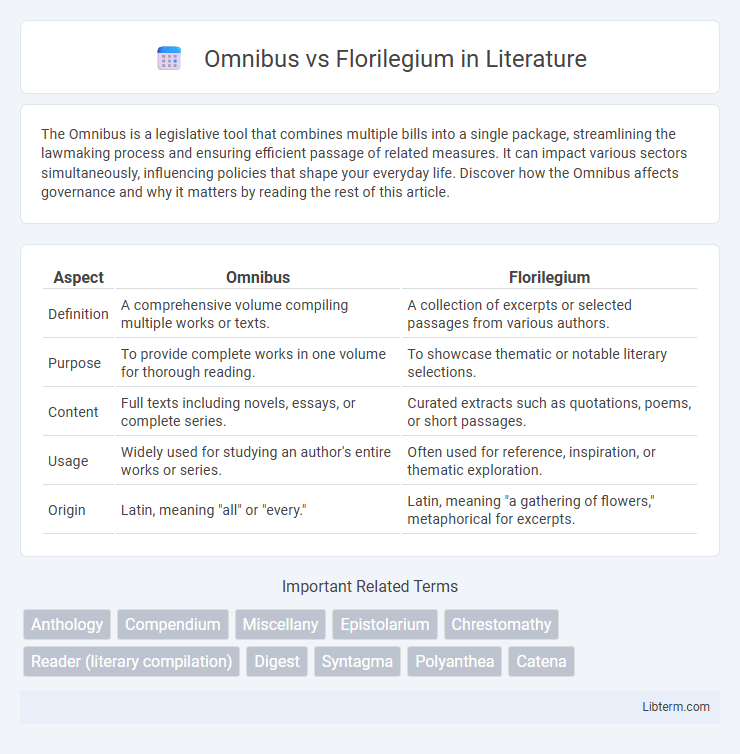The Omnibus is a legislative tool that combines multiple bills into a single package, streamlining the lawmaking process and ensuring efficient passage of related measures. It can impact various sectors simultaneously, influencing policies that shape your everyday life. Discover how the Omnibus affects governance and why it matters by reading the rest of this article.
Table of Comparison
| Aspect | Omnibus | Florilegium |
|---|---|---|
| Definition | A comprehensive volume compiling multiple works or texts. | A collection of excerpts or selected passages from various authors. |
| Purpose | To provide complete works in one volume for thorough reading. | To showcase thematic or notable literary selections. |
| Content | Full texts including novels, essays, or complete series. | Curated extracts such as quotations, poems, or short passages. |
| Usage | Widely used for studying an author's entire works or series. | Often used for reference, inspiration, or thematic exploration. |
| Origin | Latin, meaning "all" or "every." | Latin, meaning "a gathering of flowers," metaphorical for excerpts. |
Understanding Omnibus: Definition and Purpose
Omnibus editions compile multiple works or volumes by the same author or on a related theme into a single publication, enhancing convenience and thematic coherence for readers. These collections serve to preserve the continuity of narratives or scholarly discussions, often providing extended context and comprehensive access in one format. Understanding omnibus editions involves recognizing their role in aggregating content to offer a consolidated and enriched reading experience.
What is a Florilegium? Key Characteristics
A Florilegium is a curated collection of excerpts or passages from larger texts, often focusing on specific themes or topics, designed to provide insight or wisdom in a concise format. Key characteristics include thematic organization, selective inclusion of notable or authoritative content, and an emphasis on brevity and clarity. Unlike an omnibus, which compiles entire works or volumes, a florilegium distills essential ideas, making it ideal for study and reflection.
Historical Evolution of Omnibus and Florilegium
Omnibus and florilegium evolved distinctly within manuscript traditions during the Middle Ages, where omnibus referred to comprehensive collections of texts integrated into a single volume, facilitating widespread accessibility of knowledge. Florilegium, derived from the Latin for "flower gathering," emerged as curated anthologies of literary or philosophical excerpts, reflecting selective thematic compilation practices in scholastic contexts. Their historical evolution illustrates the transition from broad compendiums to more specialized collections, underscoring shifts in information organization and retrieval strategies during medieval intellectual history.
Structural Differences: Omnibus vs Florilegium
Omnibus editions typically compile complete works or a series of texts into a single volume, prioritizing chronological or thematic order for comprehensive coverage. Florilegia, on the other hand, consist of selected excerpts or passages from various sources, organized around specific themes or topics to highlight key ideas or insights. The structural difference lies in Omnibus's inclusive, often sequential format versus Florilegium's curated, thematic anthology style.
Content Compilation Approaches Compared
Omnibus editions compile comprehensive selections of texts, often presenting complete or extensive works by a single author or theme, prioritizing breadth and depth. Florilegia emphasize curated excerpts or thematic highlights sourced from multiple authors, focusing on showcasing the most significant or representative passages to facilitate quick reference and thematic exploration. The omnibus approach suits readers seeking thorough immersion, while florilegia cater to those preferring concise, contextually rich overviews.
Popular Examples of Omnibus Collections
Popular examples of omnibus collections include the "Stephen King Omnibus," which compiles multiple novels and short stories from the acclaimed horror author into a single volume, and the "Marvel Omnibus" series, featuring extensive runs of comic book storylines from iconic characters such as Spider-Man and the X-Men. These collections provide readers with comprehensive access to an author's or franchise's key works, enhancing continuity and convenience. Omnibus editions often feature restored artwork or additional editorial content, making them valuable for collectors and enthusiasts.
Notable Florilegia Throughout History
Notable florilegia throughout history include the "Antiquitates Judaicae" by Josephus, which compiles Jewish history and traditions, and the "Florilegium" by Photius, an extensive collection of excerpts from classical Greek authors. Medieval florilegia, such as those compiled by St. Isidore of Seville in the "Etymologiae," served as crucial repositories of knowledge for scholars and clerics. These thematic anthologies preserved key literary and philosophical works, greatly influencing the transmission of knowledge across generations.
Audience and Usage Scenarios
Omnibus is designed primarily for developers and data scientists who require comprehensive API solutions encompassing multiple data sources to streamline complex data integration processes. Florilegium targets researchers and academic users seeking curated collections of texts or digital humanities projects, emphasizing ease of access to specific thematic material. Usage scenarios for Omnibus include real-time data aggregation and analytics, whereas Florilegium is optimized for scholarly research, literary analysis, and educational purposes.
Advantages and Limitations of Each Format
Omnibus editions compile multiple works into a single volume, offering cost-effective convenience and comprehensive access, but their large size can be cumbersome and may overwhelm readers seeking specific content. Florilegium collections curate selected excerpts or thematic passages, providing focused, digestible insights ideal for scholarly research or thematic study, though they may lack the complete context found in full texts. Choosing between Omnibus and Florilegium depends on whether breadth and completeness or selectivity and thematic concentration best serve the reader's objectives.
Choosing Between Omnibus and Florilegium: Essential Considerations
Choosing between Omnibus and Florilegium depends on the specific focus of your interest, as Omnibus offers comprehensive, in-depth versions suitable for extensive study, while Florilegium provides curated selections ideal for thematic or introductory exploration. Consider the depth of content required, with Omnibus typically presenting full collections and Florilegium highlighting key excerpts and diverse themes. Budget constraints and the purpose of use--academic research versus casual reading--also play critical roles in deciding the suitable option.
Omnibus Infographic

 libterm.com
libterm.com